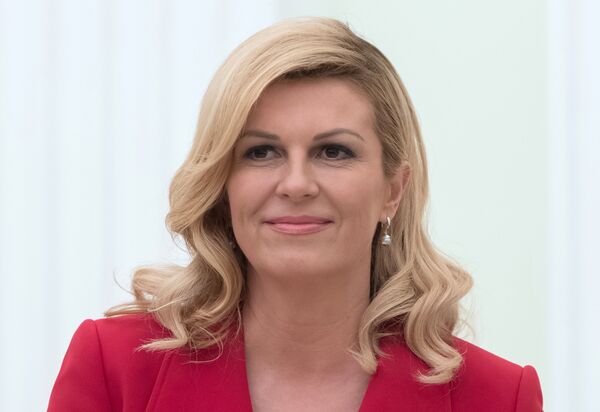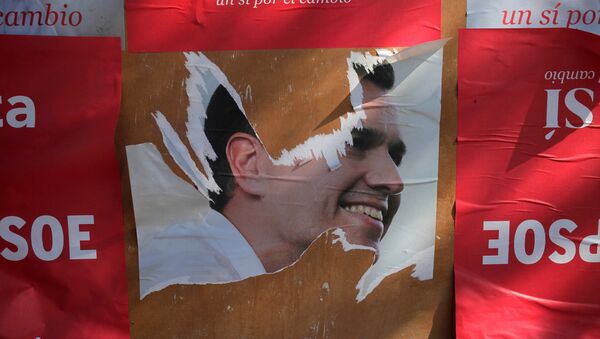Voters are set to go to the polls in Britain on either 9 or 12 December after Labour changed its position and announced it would vote for an election on Tuesday, 29 October.
Under the Fixed Term Parliaments Act, Boris Johnson needs to get two-thirds of MPs - 434 - to vote in favour of holding an election before the next scheduled poll in 2022.
But Britain is not going to be alone in having election fever.
Jesus, with this and my live tour, I’m not sure my vocal chords will be able to cope with general election fever over the next few weeks. #generalelection2019
Compare our current POLITICO Poll of Polls for the Spanish repeat election on November 10 to the election results from April 2019 on https://t.co/lip47FUoYO.#Elecciones2019 #Elecciones10N https://t.co/gnORz4kKKj pic.twitter.com/AncYKyeCr9
— POLITICO Poll of Polls (@pollofpolls_EU) October 23, 2019— Jonathan Pie (@JonathanPieNews) October 29, 2019
Argentina held a presidential election on Sunday, 27 October, with the conservative Mauricio Macri losing power in Buenos Aires to the Peronist candidate, Alberto Fernandez, who will have Cristina Fernandez Kirchner as his Vice President.
So where else is due an election before the end of 2019?
Uruguay
Uruguay held the first round of presidential elections on Sunday, 27 October and the ruling Broad Front's presidential candidate Daniel Martinez won 39 percent, ahead of conservative Luis Lacalle Pou, on 29 percent.
But the two candidates who bowed out - Ernesto Talvi of the Colorado Party and former general Guido Manini Rios of the Open Cabildo - both urged their supporters to back Lacalle in the second round on 24 November.
Uruguay:
— America Elects (@AmericaElige) October 28, 2019
An exit polls average (El Observador) shows that governing centre-left Frente Amplio reaches its worst presidential election result in 20 years: 39,1%.#Uruguay #UruguayDecide
Uruguay’s defence minister, José Bayardi, said the left-wing Broad Front had “not worked politically to help people make the link between the transformation process they have lived through and what brought that about.”
The incumbent President, Tabaré Vázquez, was prevented from standing for a second term.
Spain
When the body of Spanish dictator Francisco Franco was exhumed from the Valley of the Fallen last week, the Prime Minister Pedro Sanchez was accused of electioneering.
Spain goes to the polls on 10 November and Sanchez is hoping he can win a majority for his Socialist Party but opinion polls suggest he may struggle, especially with the ongoing troubles in Catalonia.
Compare our current POLITICO Poll of Polls for the Spanish repeat election on November 10 to the election results from April 2019 on https://t.co/lip47FUoYO.#Elecciones2019 #Elecciones10N https://t.co/gnORz4kKKj pic.twitter.com/AncYKyeCr9
— POLITICO Poll of Polls (@pollofpolls_EU) October 23, 2019
A GAD3 poll for ABC newspaper and a Sigma Dos poll for El Mundo suggest the Socialists are losing ground to right-wing parties, with the conservative People's Party (PP) and the populist Vox gaining ground.
The Socialists currently have 123 seats in the Cortes, the Spanish parliament, but they will struggle to cobble together a majority as their probable coalition partners, Podemos, only won 41 seats last time round and are facing losses.
Spain has had four polls in four years and election fatigue has set in among voters.
Two parties may win their first seats in parliament - a left-wing Catalan separatist party and Mas Pais (More For the Country), a left-wing bloc formed by Inigo Errejon, 35, who has broken away from Podemos.
Sri Lanka
Sri Lanka holds a presidential election on 16 November and it will be a straight fight between Sajith Premadasa, of the United National Party, and Gothabhaya Rajapaksa of the Sri Lanka People’s Front.
Rajapaksa was the defence minister and chief military strategist when the Sri Lankan government, under his brother Mahinda, unleashed the Army which finally defeated the Tamil Tigers in 2009. Thousands of civilians are believed to have died in the final weeks of the war as the Army cornered the Tigers on a beach in north-eastern Sri Lanka.
35 Candidates will contest Sri Lanka Presidential Election 2019 which will be held on November 16th. Sajith Premadasa contesting as the ruling party candidate while Gotabaya Rajapaksa contesting as the main opposition candidate #PresPollSL pic.twitter.com/4Hj4NGenci
— Azzam Ameen (@AzzamAmeen) October 7, 2019
Mahinda Rajapaksa was surprisingly beaten by Maithripala Sirisena in 2015.
On Tuesday, 29 October, the outgoing President Sirisena withdrew his opposition to a US $480 million dollar grant from the United States to pay for improved infrastructure.
The US had withheld the funds last year after Sirisena sacked his former ally, Prime Minister Ranil Wickremesinghe, and called snap elections, a move which was later overruled by the Supreme Court in Colombo.
Sri Lanka is dependent on foreign aid and loans and economic growth slowed to 1.8 percent last year amid the political turmoil.
The country’s vital tourist industry also took a hit earlier this year when Sri Lankan jihadists carried out suicide bombings at hotels and churches, killing 269 people, including many tourists.
Romania
Corruption is going to be a key issue in the Romanian presidential elections, which take place on 10 November.
In the spring of 2017 Prime Minister Sorin Grindeanu began amending legislation to significantly weaken regulations on abuses of power, essentially decriminalising corruption.
There were massive protests - the biggest since the fall of President Ceaucescu in 1989 - and in June 2017 Grindeanu was ousted after losing a vote of confidence.
President Klaus Iohannis, who was elected in 2014 and is seeking re-election, publicly opposed the legislation and asked the government to withdraw it.
Mapping European Parliament Election Results in Romania https://t.co/XHzqxnacLj pic.twitter.com/g1wAKb7Ljg
— 🇨🇦 GIS & Geomatics (@CanadianGIS) October 25, 2019
But he is disliked by many conservative Romanians because of his ethnic German heritage - he hails from the city of Sibiu, which had a German majority right up until the end of the Second World War.
Iohannis is up against Viorica Dăncilă, of the Social Democrats, who has been prime minister since January 2018 and a string of minor candidates.
Namibia
Africa has had a number of important elections this year - in South Africa, Nigeria and Tunisia - and only one nation is left to vote.
Namibia is a democratic country, the power lies with the people not with specific individuals or a specific political party. The rule of democracy is dictated by majority, we will not betray the lives of the Namibian people.#voteDrItula#voteNamibia#vote27November2019 https://t.co/KLv6rzsU7K
— Panduleni F B Itula (@panduleni_itula) October 29, 2019
Namibia, which became independent from South Africa in 1990 after the fall of apartheid, has been ruled by the former guerrilla group SWAPO (South West African People’s Organisation) ever since.
SWAPO leader Hage Geingob, who is 78, is expected to be re-elected President by a comfortable margin.
He is up against 10 other candidates - including Panduleni Itula, the first in Namibian history to contest for the country's top job as an independent.
Itula is seeking the youth vote and is playing on widespread anger in Africa that politics is dominated by old men. Itula has promised jobs for young people and said if he becomes president 40 percent of his ministers would be under the age of 35.
He has also vowed to fight corruption.
Croatia
Kolinda Grabar-Kitarović became Croatia’s first woman President when she was elected in 2015 and she is up for re-election at the end of December.
Grabar-Kitarović, who represented her country at the World Cup Final in Russia last year when Croatia lost to France, stood as an independent but crucially has the support of the HDZ party, which is the largest party in parliament.

The HDZ was founded by Croatia’s first President, Franjo Tudjman, who led the country when it broke away from Yugoslavia in the early 1990s.
Grabar-Kitarović will be challenged by the Social Democrat Zoran Milanovic, a former prime minister, independent MEP Mislav Kolakušić and conspiracy theorist Ivan Pernar.




